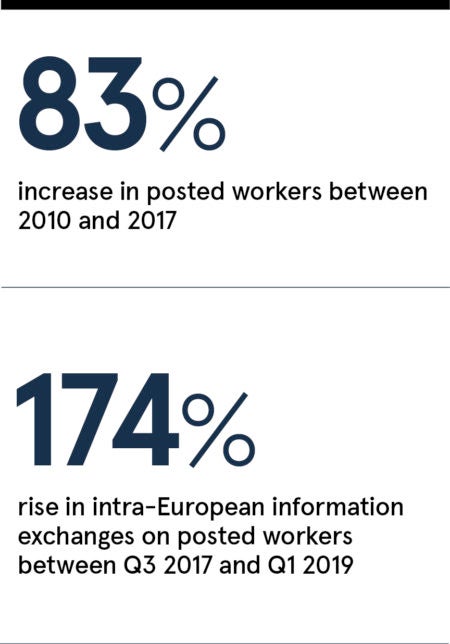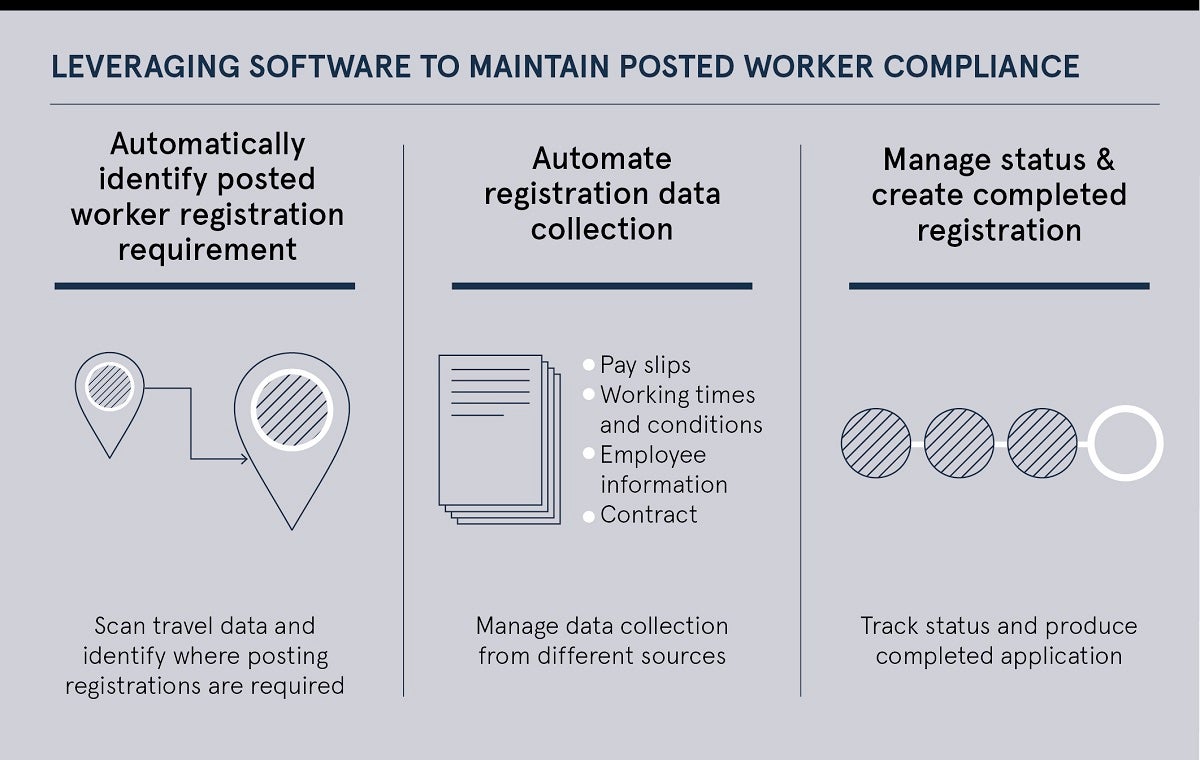The number of employees being sent to work abroad within Europe is growing steadily, mirroring global trends. According to the latest figures available, in 2017 alone, 2.8 million workers were posted from one European Union country to another, an increase of 83 per cent on 2010.
To ensure a level playing field for employees and protect their rights when being sent abroad, the EU has been enhancing its rules and enforcement around the posting of workers since the regulations were established in 1996.
The latest directive on posted workers has to be transposed into national law by July 30, 2020 and as each European country updates their rules and regulations to meet the EU regulation, the compliance obligations for an employer increase. Additionally, since the application of the directive is left to the country itself, slightly different rules apply by country, making compliance more complex.
Failure to comply with the posting country requirements can lead to fines, bans on receiving short-term postings or countries reporting the names of transgressors publicly to encourage compliance.
For example, maximum fines per worker can range from €1,165 in Malta to €10,000 in Austria and Finland. Whereas being named and shamed as an organisation that is breaching rules around posted workers can be hugely damaging to corporate reputations.
The reputational risk to a multinational of being exposed as not completing their registrations is huge
To complicate things further, companies should complete posted worker registrations in advance of the employee entering their posting country. Collecting all the necessary application information can be time consuming and potentially delay the posting process. Often the registration data needs to be provided by a range of different sources, such as pay slips from payroll, contracts from human resources and posting details from the line manager. Inevitably, collating this data without a solid process causes delays and snags.
Furthermore, leaving this process to local HR departments and payroll administrators may not be the most appropriate course of action. While the local teams are likely to know what they need to do, there are benefits in having a more organised process. 
Not only does a central process help ensure that risks and bottlenecks can be identified at a higher level, it also means the company can use one process to manage all postings, leading to better efficiency in managing the data and administration.
Software can do more than just help businesses administer compliance; innovative technological solutions can ensure the risk faced by enterprises is kept to a minimum.
“The Equus PinPoint business traveller software has dedicated posted worker features,” says Oliver Trundley, vice president of product marketing at Equus Software, a market leader in cloud-based relocation and mobility solutions. “The tool can identify posted workers from travel, calendar or expense data, create workflows to guide businesses through the registration process, including collecting information from different sources, and produce the completed registration document.”
The PinPoint application connects with HR, travel and expense systems, so when employee travel is booked, workflows will notify the relevant people in the home and posting countries to begin the application. The software will automatically route and contact the correct people for their input, which is likely to be different people in different roles, depending on the country combination.
Using workflow not only helps to determine requirements and track progress, it also enables an employer to see the status of the posting registration, make sure all steps are complete and ensure the move can happen as soon as possible.
“There is an element of process efficiency in implementing the same process everywhere. Although some of the questions and content may be different, the process and the base data will be the same,” says Mr Trundley.
For example, if the same employee has a number of postings in different locations, the copies of their employment contracts and status of existing certificates of coverage (A1s) are already saved in the system, with no need to collect them again. For managers both sending and receiving employees, using a familiar system in a consistent way makes their lives easier and thus encourages faster compliance.

Getting the right data collection method is also important. Some data can be pulled directly from HR systems via integration, some can be recycled for each posting, where employees or posting details are the same. However, there is always going to be an element of needing to contact one person, one time, to collect a little information.
For this, PinPoint can send a single-use link to allow the person to complete an online form with only the information they need to complete. This enables quick and simple data collection, while preventing users from seeing anything more than the information they are providing.
It is important for businesses working in Europe to have a way of organising and tracking posted worker applications at every stage, from identifying the posting requirement, collecting data and submitting the application to tracking the posting end-date.
“The value of the software is that it structures the data collection process and adds oversight. It reduces time spent as data can be integrated, the requirements are configured by country, and requests and notifications can be automated. Getting the registration admin as slick as possible is key for employers to get their employees to post quickly while remaining compliant,” Mr Trundley concludes.
For more information please visit www.equusoft.com/postedworkers







